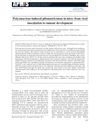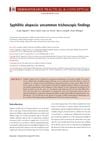 November 2021 in “Research, Society and Development”
November 2021 in “Research, Society and Development” Individualized treatment and psychological support are crucial for alopecia.
 136 citations,
May 2019 in “Cells”
136 citations,
May 2019 in “Cells” Stem cell therapy, particularly using certain types of cells, shows promise for treating hair loss by stimulating hair growth and development, but more extensive trials are needed to confirm these findings.
 77 citations,
July 2020 in “Cell”
77 citations,
July 2020 in “Cell” Muscles and nerves that cause goosebumps also help control hair growth.
 45 citations,
January 2015 in “Dermatology”
45 citations,
January 2015 in “Dermatology” Hair loss in secondary syphilis is more common than thought and can be reversed with antibiotics.
 44 citations,
September 2019 in “The EMBO Journal”
44 citations,
September 2019 in “The EMBO Journal” Lymphatic vessels are essential for hair follicle growth and skin regeneration.
 37 citations,
September 2008 in “The American journal of surgical pathology”
37 citations,
September 2008 in “The American journal of surgical pathology” Hair follicle hyperplasia is common in both benign and malignant skin lymphoproliferative disorders, with a proposed new term "pseudolymphomatous adnexitis."
 14 citations,
August 2018 in “Frontiers in Cellular and Infection Microbiology”
14 citations,
August 2018 in “Frontiers in Cellular and Infection Microbiology” Dengue virus can infect human hair follicle cells and may cause hair loss.
 10 citations,
May 2020 in “Dermatology Research and Practice”
10 citations,
May 2020 in “Dermatology Research and Practice” Proteoglycans are important for hair growth, and a specific treatment can help reduce hair loss.
 4 citations,
July 2012 in “Dermatologic Clinics”
4 citations,
July 2012 in “Dermatologic Clinics” New biopsy techniques and tools improve alopecia diagnosis, and both too much and too little selenium can cause hair loss.
 March 2023 in “bioRxiv (Cold Spring Harbor Laboratory)”
March 2023 in “bioRxiv (Cold Spring Harbor Laboratory)” Scientists can now create skin with hair by reprogramming cells in wounds.
 September 1997 in “JEADV. Journal of the European Academy of Dermatology and Venereology/Journal of the European Academy of Dermatology and Venereology”
September 1997 in “JEADV. Journal of the European Academy of Dermatology and Venereology/Journal of the European Academy of Dermatology and Venereology” The document concludes that treatments like oral anti-androgens, minoxidil, and topical spironolactone can be effective for hair loss in men and women.
 200 citations,
November 1997 in “Planta”
200 citations,
November 1997 in “Planta” Calcium affects where root hairs grow, but other unknown factors determine their growth direction.
 122 citations,
May 2010 in “Plant Physiology”
122 citations,
May 2010 in “Plant Physiology” Different PIN proteins affect plant root hair growth by changing how auxin is transported.
 20 citations,
January 2021 in “Plants”
20 citations,
January 2021 in “Plants” High energy boosts root hair growth in plants, while low energy stops it.
 10 citations,
September 2020 in “Archives of Dermatological Research”
10 citations,
September 2020 in “Archives of Dermatological Research” Both methods improve hair density and thickness; double-spin may be more effective.
 4 citations,
October 2013 in “Clinics in Dermatology”
4 citations,
October 2013 in “Clinics in Dermatology” Experts don't fully agree on how to diagnose certain hair growth disorders and more research is needed to understand them better.
245 citations,
October 2015 in “Nature medicine” Hair follicle-derived IL-7 and IL-15 are crucial for maintaining skin-resident memory T cells and could be targeted for treating skin diseases and lymphoma.
 23 citations,
July 2018 in “BMC Complementary and Alternative Medicine”
23 citations,
July 2018 in “BMC Complementary and Alternative Medicine” Certain herbal combinations in traditional Chinese medicine might be effective for treating hair loss, focusing on liver or stomach health.
 November 2023 in “Advanced Science”
November 2023 in “Advanced Science” A specific hair protein variant increases the spread of breast cancer and is linked to worse survival rates.
 November 2011 in “APMIS. Acta pathologica, microbiologica et immunologica Scandinavica./APMIS”
November 2011 in “APMIS. Acta pathologica, microbiologica et immunologica Scandinavica./APMIS” Polyomavirus A2 infection in newborn mice caused hair follicle tumors.
 65 citations,
April 2020 in “International Journal of Molecular Sciences”
65 citations,
April 2020 in “International Journal of Molecular Sciences” PRP injections may be a safe, effective alternative for hair loss treatment compared to minoxidil and finasteride.
 41 citations,
January 2020 in “BioMed Research International”
41 citations,
January 2020 in “BioMed Research International” Micrografts improve hair density and thickness without side effects.
 28 citations,
January 2011 in “Hearing Research”
28 citations,
January 2011 in “Hearing Research” Gene therapy, especially using atoh1, shows promise for creating functional sensory hair cells in the inner ear, but dosing and side effects need to be managed for clinical application.
 3 citations,
August 2012 in “Annals of Diagnostic Pathology”
3 citations,
August 2012 in “Annals of Diagnostic Pathology” AIDS may cause changes in the scalp that increase infection risk and hair loss.
 January 2025 in “Current Issues in Molecular Biology”
January 2025 in “Current Issues in Molecular Biology” Certain plant extracts may help prevent hair loss and promote hair growth safely.
 February 2024 in “ACS Omega”
February 2024 in “ACS Omega” The Shen Bai Hair Growing Decoction may help treat hair loss by promoting hair growth and reducing inflammation.
 32 citations,
July 2017 in “Dermatology practical & conceptual”
32 citations,
July 2017 in “Dermatology practical & conceptual” New hair and skin changes were found in a rare case of syphilis-related hair loss.
 May 2009 in “The American Journal of Dermatopathology”
May 2009 in “The American Journal of Dermatopathology” Mast cells play a significant role in hair loss conditions like male pattern hair loss and alopecia areata.
 January 2023 in “Springer eBooks”
January 2023 in “Springer eBooks” Using one's own blood platelets and fat can improve facial and hair appearance without surgery.
 15 citations,
January 2014 in “Dermatology”
15 citations,
January 2014 in “Dermatology” Some patients with a type of skin lymphoma can experience a rare, non-scarring hair loss that looks like another hair loss condition but has distinct features.





























